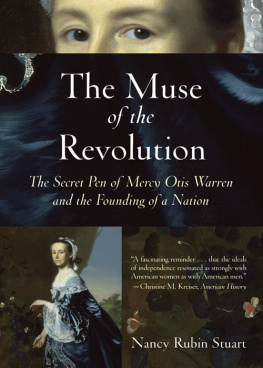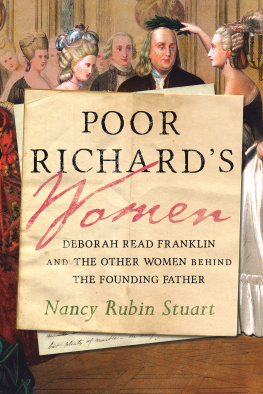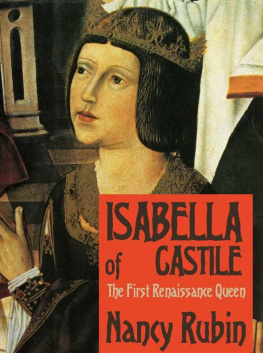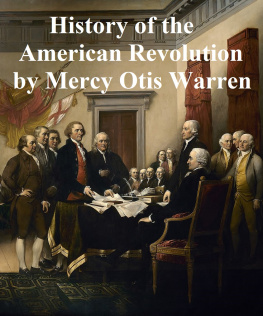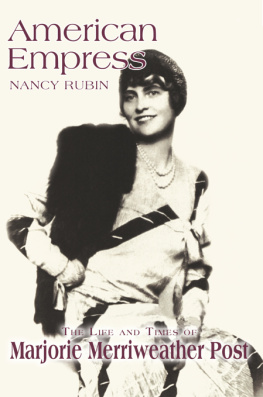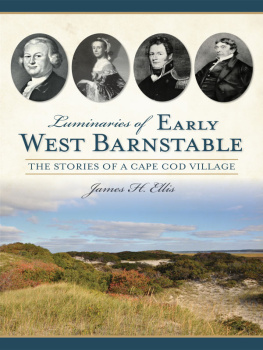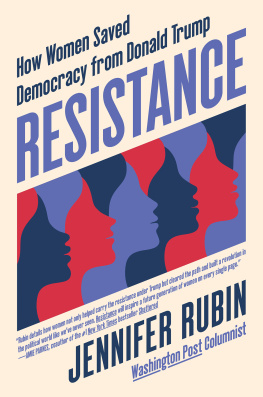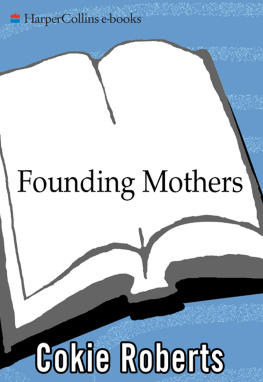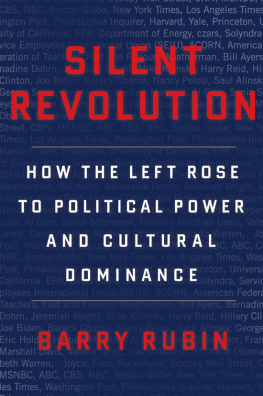
To Bill,
first friend of my heart
ALSO BY NANCY RUBIN STUART
The Reluctant Spiritualist:
The Life of Maggie Fox
American Empress: The Life and Times
of Marjorie Merriweather Post
Isabella of Castile:
The First Renaissance Queen
The Mother Mirror: How a Generation of
Women Is Changing Motherhood in America
The New Suburban Woman:
Beyond Myth and Motherhood
CONTENTS
PREFACE
WHEN I BEGAN RESEARCHING this biography of Mercy Otis Warren, friends often wondered about her identity. I explained that John Adams considered her the most accomplished woman in America
During the Revolutionary era, Mrs. Warrens propaganda plays appeared on the front page of the Massachusetts Spy and the Boston Gazette. A dozen years later, her widely distributed pamphlet Observations on the New Constitution influenced the Bill of Rights. By 1805 her three-volume publication of TheHistory of the Rise, Progress and Termination of the American Revolution became the sole Antifederalist, or Jeffersonian republican, interpretation of that extraordinary event.
Mrs. Warrens words still have a contemporary ring. Americans, she reminded readers of her History, must never forget that the elective franchise is in their own hands; that it ought not to be abused, either for personal gratifications, or the indulgence of partisan acrimony. The principles of revolution ought ever to be the pole-star of the statesman, respected by the rising generation.
To most people, Mercy Otis Warren, nevertheless, remains a forgotten Founding Mother. While occasionally cited in books about the Founding Fathers, studies of her life are usually confined to college seminars, academic biographies, and the rare-book rooms of libraries.
It was not my intention to focus upon the theoretical aspects of Mrs. Warrens long life, but rather to paint an intimate picture of her life for the general reader. Through excerpted selections from her correspondence, Mercy Otis Warren reveals herself as a perceptive, strong, and deeply caring individual, sometimes foolishly driven by emotions, at other times guided by cool rationality, alternately witty and vitriolic, but ultimately human in her flaws and virtues.
The reasons for Mrs. Warrens obscurity are complex, a result of the eighteenth-century bias against learned women and her commitment to the unpopular republican values of the early Revolution.
Relatively few biographies have consequently appeared on Mercy Otis Warren. The first, in Eizabeth Eletts 1848 series, The Women of the American Revolution, hailed her as perhaps the most remarkable woman who lived at the time of the Revolution. By 1896, playwright Alice Brown had obtained copies of her letters and wrote the first documented account of her life. In the mid-twentieth century, Katharine Anthonys biography reminded modern readers of Mrs. Warrens existence, followed in 1995 by Rosemarie Zagarri and Jeffrey Richards two analytical studies of her life and work.
Mercy Otis Warren would probably have applauded those efforts, especially since her correspondence often lamented womens second-class status. Repeatedly, in her plays and poems, she portrayed female weakness and dependence upon their men, implicitly urging readers to behave courageously in the face of ongoing civil strife.
When Betsy, one of the young women Mrs. Warren counseled later in life, asked why women were often ignorant or silly, the author maintained that their deficiency was less related to the interior contexture of female intellect than the different education bestowed on the sexes. A complete education for women, she insisted, would make them rational companions to men and distinguished for their economy in the home.
Highly educated herself, Mrs. Warren enjoyed the full measure of a womanly life. Happily married to Massachusetts merchant-farmer and politician James Warren, the mother of five sons, a skilled homemaker, needle worker, and gardener, her life epitomized the advice she once gave a niece. If a woman had a kind husband, a pleasant home, a decent income, and good children, she had all that the world could bestow.
Proof of Mrs. Warrens belief in that formula appears in her letters, revealing her own traditional dependency upon men for emotional supportespecially from her husband, James, her mentor, John Adams, and in old age, from her sons Henry and James, Jr.
By the late twentieth century, feminist scholars observed that regardless of Mrs. Warrens support for womens educational equality, her published work never specifically addressed that issue unlike other, slightly younger writers like Judith Sargent Murray, Catharine Macaulay, and Mary Wollstonecraft. Feminist historians also ponder why Mrs. Warren failed to respond to Abigail Adamss 1776 petition in reaction to her husband Johns rejection of her plea to Remember the ladies.
No less ironic to me were the occasions when, in spite of Mrs. Warrens patriotic fervor, she balked when her husband, James, was offered important Revolutionary posts that required long absences from Massachusetts. As I have indicated in the pages below, her traditional dependence upon James often intruded, and indeed, precluded, the full achievement of the Warrens fervently expressed patriotic goals. In her defense, the high-strung Mrs. Warren was approaching fifty at the time of the Revolution, having spent most of her adult life as a conventional wife and mother.
Her literary bent, her paternal familys participation in the politics of Massachusetts Colony, and her brother James the Patriots role as spark to the Revolution nevertheless inspired her to compose inflammatory plays, poems, and essays. Another factor was the Revolution itself, which transformed her, Abigail Adams, and their friends into war widows, who clung to one another for comfort and expressed their patriotism by raising loyal citizens in what contemporary historian Linda Kerber famously termed Republican Motherhood. Other contemporary scholars, such as Mary Beth Norton and Nancy Cott, traced that generations rising awareness of female strength as antecedents to the nineteenth-century suffrage movement.
To portray Mrs. Warrens life, I drew upon primary sources from her correspondence and those of her contemporaries. Among them were the unpublished Warren Family Letters and Papers, 17631814 housed at the Archives of Pilgrim Hall Museum, the Mercy Otis Warren Papers at the Massachusetts Historical Society, and the published collections of her correspondence in the Warren-Adams Letters,The Correspondence of John Adams and Mercy Otis Warren, the Adams Family Correspondence, and A Study in Dissent: The Warren-Gerry Correspondence 17761792.
Mrs. Warren once told John Adams she believed the reader should never suffer from fatigue when listening to the humiliating story of human conduct. In that spirit, I have modernized the spelling and capitalization of original sources.
Mercy Otis Warrens life as wife, mother, homemaker, patriot, and author remains exceptional even by the standards by which we judge womens lives today. While often anonymously published, her work, the caricatures in her popular propaganda playsthe first written by an American womanher forthright plea for a Bill of Rights, her poetry, and her three-volume

